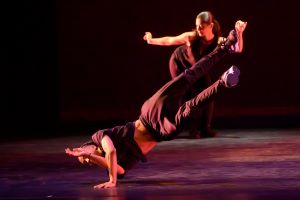Hill Hall is a majestic kind of place. The tall windows on the North side of the room allow natural sunlight to dance across the aisles. Cordovan-covered seats (that don’t squeak) and polished wood flooring create warmth and beauty. What makes it so regal, however, is the extraordinary music that takes place there. On this occasion four UNC composers were present along with special guest Allen Otte (b.1950). All were born after WWII: Allen Anderson (b.1951), Stefan Litwin (b.1960), Stephen Anderson (b.1970), and Lee Weisert (b.1978). Their compositions were performed by guest artists Paul Jacobs, piano, Allen Otte, percussion, and Ib Hausmann, bass clarinet; UNC faculty members Clara Yang, piano, and Melissa Zwicker Martin, soprano; and students Ledah Finck, violin, and Alex Ullman and John Reardon, cellos.
Timbre, the quality of musical sound, is of great importance in contemporary music. John Cage considered it more important than rhythm or pitch. Tonal harmony is often thrown out the window; music is made by flipping pages through a phonebook, for example (Living Room Music [1940], by Cage). On this occasion, the featured works involved a myriad of beautiful timbres made by instruments ranging from a small (soprano) xylophone to a thunderous concert grand; and from the human voice to the violin.
Allen Otte’s 2013 12 Fragments of Sappho (compiled by Anne Carson, 2002) brings to life the words of the ancient Greek poet. With a soft, lyrical voice, Otte reads from a very large book (perhaps one found on the Island of Lesbos?). He accompanies himself on a xylophone while improvising in a variety of styles; by choosing different mallets between sections, he creates subtle changes in timbre. Completely enchanted, I pictured Sappho reciting her text – outdoors, under the stars.
The violin is said to embody qualities of the human voice. But any contemporary player will tell you that the violin can produce so much more. Ledah Finck performed Stephen Anderson’s Deviation for solo violin and MAX/MSP (2003). (MAX/MSP is a visual programming language for music and multimedia; click here and be sure to see the photos.) Anderson, like a wizard concocting something very dangerous, “played” the computer while following the score. Glissandos up and down the fingerboard, on the bridge (sul ponticello), and plucking (pizzicato) and bouncing the bow stick on the strings (col legno), Finck played her part with confidence and panache. Stir in Anderson’s electronic manipulation and you have, in the parlance of Simon and Garfunkle, a groovy piece.
While playing the piano, Stefani Litwin read the text from the powerful “El Once” (from La Ciudad ) by the Chilean poet Gonzalo Millan (1947-2006).* His voice, instead of riding on top, is part of a rich texture. Litwin’s composition is like a colorful woven cloth; each thread having unique thickness and feel. Flutter tonguing by the clarinet, stomping feet, and silence add color, and at last, Litwin’s voice rises above, as if to ask the question, “what would happen if…?”
Lee Weisert’s stunning Érard (2012) was performed by Clara Yang. Weisert calls his work “rigidly mechanistic,” but in the hands of a virtuoso, it becomes much more. Allen Anderson’s Instrument of the Tongue (2007) explores the nature of birdsong and poetry. It was performed by Melissa Zwicker Martin and Paul Jacobs. Martin, an alumna of UNC music department, has a powerful, fully-developed and glorious voice, and she uses it well. Paul Jacobs, with flawless technique, was the perfect collaborator. For better or worse, Hill Hall is acoustically a lively space (especially when it is not filled); the poetry was nearly lost. Following along the texts by Emily Dickinson, Robert Frost, and others fixed that problem. I hope these pieces are programmed again in the near future.
On this warm spring day, the campus was awash with natural color. And what a marvelous concert! Completely energized, I left feeling nourished and happy.
“Four Composers” (actually four plus one) was part of the William S. Newman Artists Series and Talking Music Series on the campus of UNC-CH. The next concert will be Wednesday, April 9, 2014 at 7:30 p.m.
*Listen to the poet read “El Once” (The Eleventh) here.
Note: Good news! I have it on good authority that Hill Hall will be further modernized with air-conditioning in one year.











